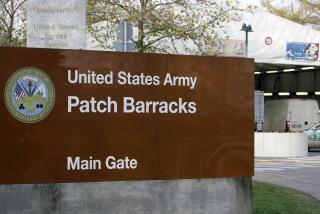U.S. to Seek Allies’ Help in Bosnian Skies : Diplomacy: During a week in Europe, Christopher will try to enlist NATO air power for defense of safe areas.
- Share via
LUXEMBOURG — Secretary of State Warren Christopher arrived in Europe on Tuesday hoping to persuade Washington’s NATO allies to share in the air defense of safe areas in Bosnia-Herzegovina.
A senior Administration official said Christopher will ask the allies to join the United States in providing air cover for U.N. peacekeeping troops deployed in the six enclaves that the United Nations hopes to set up to protect Bosnian Muslim civilians from the Serbian onslaught that has already conquered 70% of Bosnia’s territory.
The official said the carnage in Bosnia and other parts of the former Yugoslav federation will be high on Christopher’s agenda at all stops of his weeklong European trip, which begins today with his talks with foreign ministers of the 12 European Community nations.
In addition to the U.S.-European talks, held twice a year since 1990 to coordinate transatlantic policy, Christopher will attend a meeting of NATO foreign ministers Thursday and Friday in Athens and will meet Turkish officials over the weekend in Ankara and Istanbul.
The senior official, who talked to reporters aboard Christopher’s Air Force transport on the flight from Washington, said the North Atlantic Treaty Organization has already taken on the responsibility of enforcing the U.N.-ordered “no-fly” zone over Bosnia that bars the use of military aircraft by the Bosnian combatants. He said it is logical to expand that role to include defense of the protected areas--Sarajevo, Srebrenica, Gorazde, Tuzla, Bihac and Zepa.
“The U.S. commitment to protect from the air would become a NATO commitment,” the official said of the havens.
Even if the NATO foreign ministers agree, another official said, most of the air power will still be American. But Christopher considers it symbolically important to bring in the warplanes of at least some of the other 15 NATO nations, the official said.
The proposal seems to dilute still further the limited U.S. military commitment. When the United States joined France, Britain, Russia and Spain in calling for the safe areas plan, the Clinton Administration said it would not send U.S. ground troops to defend the enclaves. Instead, it offered to provide air cover to the U.N. forces.
Four NATO nations--France, Britain, Canada and Spain--already have contributed ground troops to the U.N. force, and some of those countries, with France being the most outspoken, have complained that Washington is choosing the relatively safe task while they must shoulder the more hazardous work on the ground.
On Tuesday, Lord Owen, the European Community’s mediator for the Balkan conflict, said it is “weakening (and) debilitating if the United States, as the most powerful country in NATO, is not ready to contribute ground forces.”
”. . . I think one must assume that they are not going to put troops on the ground,” he said.
Owen said the question is whether Europe can fill a gap left now that “probably foolish” assumptions of the United States’ contributing up to 25,000 troops to protect the havens are unlikely.
Christopher’s trip comes at a critical time for him personally; he has been criticized for his failure a month ago to persuade Russia and the NATO countries to endorse a U.S. plan to lift the arms embargo against the Muslim-led Bosnian government and to bomb Serbian artillery.
Washington later agreed to an alternative plan, pushed by Western Europe and Russia, to set up the six havens.
Despite the focus on the havens, the senior official aboard Christopher’s plane said the United States has not yet given up on its plan to level the battlefield by sending arms to the Bosnian Muslims and bombing the Serbs.
More to Read
Sign up for Essential California
The most important California stories and recommendations in your inbox every morning.
You may occasionally receive promotional content from the Los Angeles Times.













